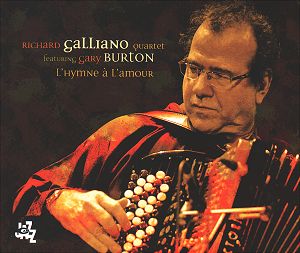1. Milonga is Coming
2. Triunfal
3. L'Hymne à l'Amour (If You Love Me)
4. Sinfonia 11 in G minor, BWV 797
5. Soledad
6. Para Jobim
7. Operation Tango
8. Romance del Diablo
9. Waltz for Debby
10.
Il Postino
Richard
Galliano – Accordion
Gary
Burton – Vibes
George
Mraz – Bass
Clarence
Penn – Drums
Hot
on the heels of Richard Galliano’s Live
in Marciac CD (which I reviewed here a
few weeks ago) comes another Galliano album,
this time with a quartet featuring vibist
Gary Burton. The interplay between the two
leaders is reminiscent of the duets which
Gary Burton recorded with Chick Corea. Here
Burton’s vibes are paired with a different
keyboard instrument, but the result is a similar
meeting of two brilliant musical minds.
The
album exemplifies how jazz has expanded its
horizons: assimilating influences from a multitude
of musical styles – in this case from world
music and even the classics. This new fusion
has spread throughout jazz, sometimes displacing
the primacy of swing in favour of romantic
expression. On this album, the main world
music influence comes from the Argentinian
composer Astor Piazzolla, who wrote half of
the tunes on this CD. Gary Burton has already
recorded an album devoted primarily to Piazzolla
compositions and his feeling for Astor’s music
is radiantly clear. Richard Galliano’s recordings
have testified to his love of the Argentinian
tango, which is at the heart of Piazzolla’s
writing, so both he and Burton are ideal exponents
of this music.
The
CD opens with two Piazzolla compositions:
Milonga is Coming being gently poetic,
while Triunfal has a shifting rhythm
which owes much to the tango. Richard Galliano’s
accordion often evokes a French atmosphere
and this is particularly true of the title
track – Edith Piaf’s L’Hymne å l’Amour
(alias If You Love Me), which is played
very slowly and thoughtfully. Here and throughout
the album, the mood is heightened by the lyricism
implicit in Gary Burton’s mastery of the vibraphone.
A
change of style is marked by the fourth track:
a Bach sinfonia where the counterpoint is
accentuated by the jazz-waltz pulse. Soledad
is a mournful Piazzolla tune, and Para
Jobim is Richard Galliano’s appropriate
tribute to the master of the bossa nova. After
a couple more Piazzolla numbers, there is
Waltz for Debby, the jazziest tune
on the CD - although the jazz element is reduced
by Gary Burton’s arrangement. If there is
one criticism of this album, it is that every
track is closely arranged (by either Burton
or Galliano) leaving sparse space for the
improvisation at which one knows both men
excel. The rhythm team of George Mraz and
Clarence Penn tend to be shifted into the
background, so that one hardly notices their
presence much of the time. Yet one cannot
complain, when the music is so exquisitely
lovely.
The
album closes with another meditative interpretation
– of Luis Bacalov’s theme for the film IL
Postino (The Postman). The listener
is strongly tempted to switch back again to
the start of the album to hear it all over
again and savour its peaceful beauty. As Galliano
says in his sleeve-note: "L’Hymne
å l’Amour raises itself, more than
ever, against violence, terrorism and war".
Tony
Augarde
